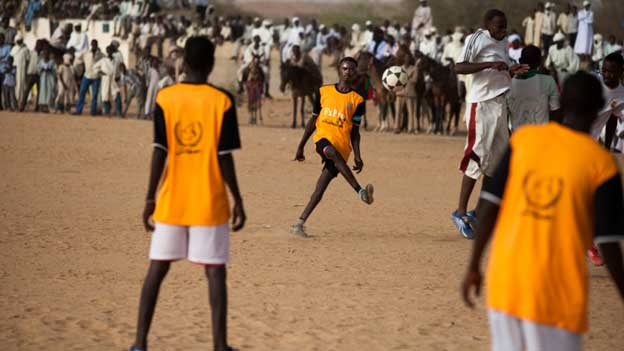UN Should Aspire to Turn Sports into a Tool for Social Change

KATHMANDU, Nepal, Apr 01 (IPS) - The International Day of Sport for Development and Peace, which will be commemorated on April 6, is a day that celebrates the positive effects that sports can have on the society.
The humanity needs to confront existential challenges but few remember that in September 2019 the United Nations declared the then upcoming decade as the ‘Decade of Action”, ten precious years where the world would act at unison to achieve the Agenda 2030.
Then the international community could not imagine that a devastating pandemic was about to come and the consequences of Covid-19 are still being experienced throughout the world.
The suffering and painful experiences that many of us have been going through in the last two years show that the vision enshrined in the Agenda 2030 is still a far cry from being realized.
The United Nations Secretary General’s response to these daunting challenges is called “Our Common Agenda”, a blueprint for a stronger, fairer and more inclusive multilateral world.
In this special day we need to ensure that sports can play a significant role in putting such bold plans into action, turning ambitious goals into a real opportunity to mobilize millions of people.
This is the power of sports and it is key that we think of sports for development and peace not as a standing alone sub-area.
Rather our efforts should be to turn the entire sports industry into a tool for social change.

Certainly, when we talk about sports for development and peace, we refer to thousands of not-for-profit organizations, the vast majority of whom, despite their small in size and budgets, are active on the ground, trying to offer solutions to myriad of problems at local level.
For example, sports can bring people together and be an enhancer of a society that is more equal and just where women, vulnerable groups can have a stronger voice and agency.
If we think about disability, we know that millions of persons with disabilities in the developing world, still face multiple problems that deny them their rights to have a dignified life.
Investing in inclusive sports practices can be a powerful tool that can bring people together, persons with disabilities but also persons without disabilities.
It can be an important advocacy tool for a better level playing field, allowing people without disabilities to think and reflect about their privileges and the lack thereof for their disable peers.
In short sports can be a glue that connects people but it can also be a potent platform where disadvantaged persons can train their skills and fulfill their ambitions.
Let’s call this the uniquely transformative power of sports.
We know many stories of sports celebrities, champions admired throughout the world that could find their path to glory because of their achievements in the field of sports.
That’s why this special day should not be just celebrated as a day for committed advocates and practitioners alone but rather as an opportunity to push for a better leveraging of sports to help those left behind and at disadvantage to find a way forward in life.
For this to happen, we need a comprehensive strategy able to attract the interest of all stakeholders involved in sports.
The true is that, while sports for development and peace is more and more recognized worldwide as a social innovation, there is still huge divide between such practices and the mainstream sports industry.
Many global sports clubs with resources and phenomenal outreach are doing their bit to promote a positive use of sports within local communities but we need to be more ambitious.
What it is indispensable is to reach a new global understanding on the transformative role sports can have.
That’s why the United Nations Secretary General needs to elevate sports at the core of his Our Common Agenda, ensuring that sports can be, not only the unifying factor, the glue but also the toolkit that can bring the required change.
United Nations agencies should do a better job not only at mainstreaming sports in their programs but also enabling partnerships with professional sports as well, engaging and working with clubs and leagues to truly harness sports for the common good, not as just a nice “add on”, through the usual CSR projects, but as a key strategy for their success.
The Our Common Agenda envisions a series of global gatherings and initiatives focused on different themes, including education and the future of job market and gender equality.
Interestingly, within this blueprint, there is a commitment to do more to involve and engage youth meaningfully.
The ideal goal for Secretary General Guterres would be a different United Nations that can do a much better job to prioritize youth’s needs and aspirations, putting them in the driving seat.
It will certainly take a lot of effort to shift gear and move from words to deeds in making the United Nations more youth centric.
Starting truly investing in sports, bringing them at the center of the development and social agenda in the developing as well higher income countries, is certainly one of the best ways to implement the Agenda 2030.
It will bridge the generational divides and allow more and more youth to be in the “game” not as spectators but as key protagonists.
If you think about, there is really no better way to get into actions in this decade.
Pawan Ghimire is chairman - Cricket association of the blind Nepal and treasurer of World Blind Cricket Limited, UK
Simone Galimberti is the Co-Founder of ENGAGE. He can be reached at [email protected]
IPS UN Bureau
Follow @IPSNewsUNBureau
Follow IPS News UN Bureau on Instagram
© Inter Press Service (2022) — All Rights Reserved. Original source: Inter Press Service

